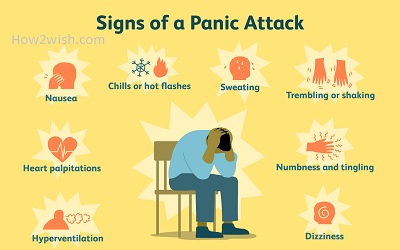Panic attacks cause a significant acceleration of the heartbeat, frequent chest breathing, and, as a result, a feeling of lack of oxygen, and stuffiness. In such conditions, it is easy to dive into a state of helplessness due to a loss of control over oneself. To help a person with a panic attack, you need to focus on actions that will help regain a sense of control and turn on the parts of the brain responsible for sleep and relaxation. It is useful to wash your face with cold water and let the water drink in slow sips.

Here are a few steps to take next.
Signs and Symptoms of a Panic Attack
- Rapid heart rate or palpitations
- Sweating
- Trembling or shaking
- Shortness of breath or feeling like you’re choking
- Chest pain or discomfort
- Nausea or abdominal distress
- Feeling dizzy, lightheaded, or faint
- Feeling detached from reality or a sense of unreality
- Fear of losing control or going crazy
- Fear of dying
How to Help Someone During a Panic Attacks
Step 1: Force the brain to focus not on emotions
During a panic attack, the most difficult task is to pull out and distract a person from this state. Favorite music, book, games on your smartphone, repetition of a verse by heart – use any task that requires concentration. This will force you to focus not on emotions that flood, but on understandable actions. You can do this practice on your own if panic covers you personally.
Step 2: “Turn on” the body
Grounding into the body by focusing on sensory sensations can also help a person with a panic attack to de-escalate.
You can use different sectors, for example, tactile and taste. What to do?
- Sort out the beads of the bracelet;
- Crumple paper;
- Earlobe massage;
- Knead the feet;
- Squeeze/unclench your palms;
- Rub your palms until warm;
- Suck on a lollipop;
- Chew menthol gum;
- Feel the texture of the floor with bare feet.
Step 3: Slow down your breath
Decreased oxygen levels in the blood due to erratic, rapid breathing is another problem worth fighting to help a person suffering from a panic attack.
To do this, help him slow down his breathing. Take your hands and breathe synchronously: for 5 counts, slowly draw air into your lungs, hold it for a second, and slowly exhale for 5 counts.
During a panic attack, a person does not belong to himself. Your main task is to distract from fear and help you regain control over your emotional and physical state step by step.
How to help a person with a panic attack from a distance?
In modern conditions, we can not always be close to those close to us physically. But it’s worth staying in touch because the steps described above can be helped to overcome over the phone. The main thing is to let your loved one feel that he is not alone with the problem.

Interesting on the topic Apathy: Definition, Causes, Symptoms & Treatment
Additionally, you can try a few more ways:
Method 5-1
Ask the person to name the following things:
- 5 things I see;
- 4 things I touch;
- 3 things I hear;
- 2 things I can smell;
- 1 thing I can taste.
Method “Around me is”
Ask to look around (be sure to look up, look around) and name the objects around with some characteristic. “There are around me: a gray chair, a white chandelier, green curtains, etc.”
The main task of these methods is to shift the focus of perception from uncontrollable emotions to accessible points of control over the situation.
FAQs
Can panic attacks be cured?
While there is no cure for panic attacks, they can be managed with appropriate treatment, such as therapy or medication.
Should I call an ambulance if someone is having a panic attack?
If you are unsure whether the person is experiencing a panic attack or a medical emergency, it is best to err on the side of caution and call an ambulance. However, if you know that the person has a history of panic attacks and they feel comfortable with you helping them, you can provide support until the attack passes.
Can panic attacks cause long-term damage?
Panic attacks themselves do not cause long-term physical damage, but they can have a negative impact on a person’s quality of life if they are frequent and severe. Seeking professional help can reduce the likelihood of long-term negative consequences.
What should I do if I have a panic attack?
If you are experiencing a panic attack, try to focus on slow, deep breathing and remind yourself that the attack will pass. It may also be helpful to remove yourself from any triggers if possible. Seeking professional help can provide you with strategies for managing future attacks.
Can lifestyle changes help prevent panic attacks?
Engaging in self-care and stress-reducing activities, such as exercise, meditation, and spending time in nature, can help to reduce the likelihood of future panic attacks. However, if you are experiencing frequent panic attacks, it is important to seek professional help.
